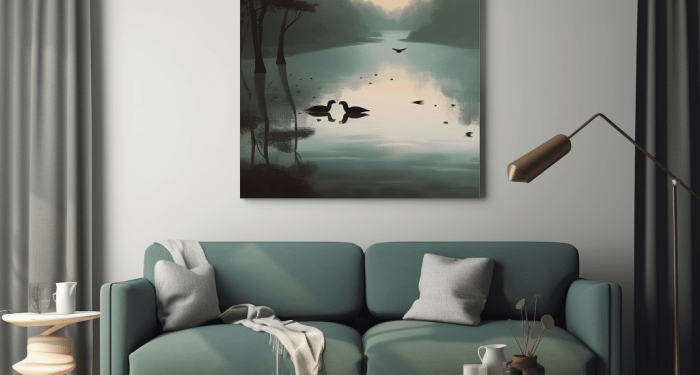Embark on a journey towards mental clarity and improved health with the minimalist lifestyle. By simplifying our surroundings and prioritizing essentials, we can create a space that promotes peace of mind and well-being. Let's delve into how embracing minimalism can transform not just our physical spaces, but also our mental landscape.
As we explore the benefits, strategies, and practices of minimalist living, a world of possibilities opens up for enhancing our overall quality of life.
Benefits of a Minimalist Lifestyle
Living a minimalist lifestyle can have numerous benefits for mental clarity and overall health. By simplifying your surroundings and reducing material possessions, you can create a more peaceful and organized environment that promotes a sense of calm and focus in your daily life.
Decluttering Physical Spaces
Decluttering physical spaces, such as your home or workspace, can have a significant impact on your mental well-being. A clutter-free environment can reduce feelings of overwhelm, anxiety, and stress. When you eliminate unnecessary items and only keep what is essential, you create a space that is conducive to relaxation and productivity.
This can lead to improved mental clarity, better decision-making, and increased creativity.
Reducing Material Possessions
Owning fewer material possessions not only simplifies your life but also reduces the mental burden of managing and maintaining excess belongings. By letting go of items you no longer need or use, you free up physical and mental space for things that truly matter to you.
This process of minimizing possessions can help alleviate stress, increase feelings of contentment, and improve your overall mental health.
Strategies for Adopting a Minimalist Lifestyle

Embracing a minimalist lifestyle can significantly enhance mental clarity and overall well-being. Here are some practical tips to help you simplify your daily routines, declutter your living spaces, and prioritize essential items.
Simplify Daily Routines
One effective way to promote mental clarity is by simplifying your daily routines. Start by identifying tasks that add unnecessary stress or complexity to your day. Streamline your morning and evening rituals by creating a minimalist routine that focuses on essential activities only.
This will help you save time and mental energy, allowing you to approach each day with a clear mind.
Declutter and Organize Living Spaces
Gradually decluttering and organizing your living spaces is key to adopting a minimalist lifestyle. Begin by tackling one area at a time, such as a closet or a room, and sort through your belongings. Keep only items that serve a purpose or bring you joy, and let go of the rest.
Consider donating or selling excess possessions to create a more spacious and peaceful environment in your home.
Priority on Essential Items
It is essential to prioritize essential items in your daily life and let go of excess possessions. Evaluate your belongings regularly and identify items that are truly necessary for your well-being. By focusing on what truly matters and eliminating unnecessary clutter, you can create a more intentional and fulfilling lifestyle.
Remember, less is often more when it comes to promoting mental clarity and health.
Minimalist Diet and Nutrition
Embracing a minimalist diet can have a profound impact on both mental clarity and overall health. By simplifying our food choices and focusing on nutrient-dense options, we can support our well-being in a holistic way.
Simple and Nutritious Meal Ideas
When following a minimalist diet, it's important to prioritize whole foods and avoid processed or refined options. Here are some examples of simple and nutritious meal ideas:
- Quinoa salad with mixed vegetables and a lemon vinaigrette
- Grilled salmon with roasted sweet potatoes and steamed broccoli
- Vegetable stir-fry with tofu and brown rice
Mindful Eating Practices for Mental Well-being
Mindful eating involves paying attention to the sensory experience of eating and being fully present during meals. This practice can help promote mental well-being by fostering a healthy relationship with food and reducing stress. Some benefits of mindful eating include:
- Improved digestion and nutrient absorption
- Increased satisfaction from meals
- Enhanced awareness of hunger and fullness cues
Minimalism in Digital Spaces
In today's digital age, our online presence can sometimes become overwhelming with constant notifications, emails, and social media updates. Adopting a minimalist approach in digital spaces can help improve mental clarity and focus by reducing distractions and unnecessary clutter.
Organizing Digital Files
Organizing digital files is essential for a minimalist approach to digital spaces. Create folders and subfolders to categorize different types of files such as documents, images, and videos. Regularly delete or archive files that are no longer needed to streamline your digital storage.
Managing Emails
To maintain a minimalist approach to emails, unsubscribe from unnecessary mailing lists and newsletters. Create folders or labels to organize incoming emails based on priority or topic. Set aside specific times during the day to check and respond to emails to avoid constant distractions.
Digital Detox and Setting Boundaries
Taking regular digital detox breaks can help refresh your mind and reduce screen time. Set boundaries by designating tech-free zones in your home or establishing specific times where you disconnect from all digital devices. Prioritize face-to-face interactions and engage in activities that do not involve screens to maintain a healthier relationship with technology.
Summary
In conclusion, adopting a minimalist lifestyle offers more than just a tidy living space. It provides a sanctuary for our minds to thrive, unburdened by excess and clutter. By embracing simplicity and mindfulness, we pave the way for mental clarity and holistic health.
Helpful Answers
How can minimalism contribute to mental clarity?
Minimalism reduces distractions and creates a calm environment, allowing for clearer thinking and improved focus.
What are some practical tips for adopting a minimalist lifestyle?
Start small, declutter regularly, and prioritize quality over quantity when it comes to possessions.
How does minimalist eating impact mental clarity?
Minimalist eating focuses on nutritious, simple meals that support overall well-being and cognitive function.
Why is reducing digital clutter important for mental clarity?
Digital clutter can overwhelm the mind and hinder productivity, so simplifying digital spaces can lead to improved focus and mental clarity.














